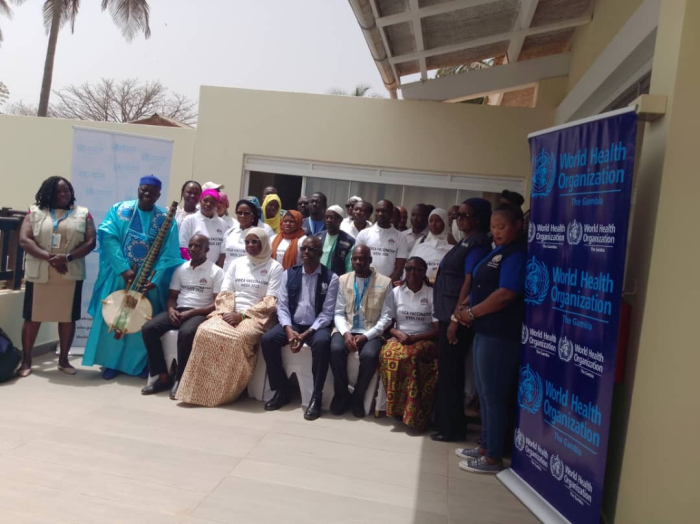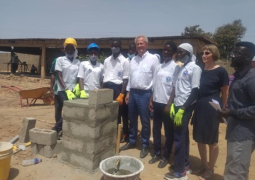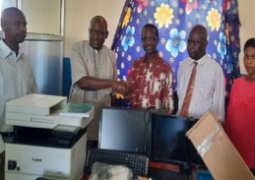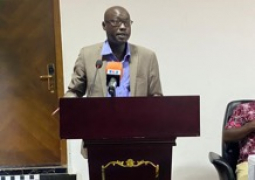
The Africa Vaccination Week, endorsed in September 2010 by the resolution AFR/RC60/14 to strengthen immunization programs in the African Region, is celebrated the last week of April each year simultaneously with the World Immunization Week.
In essence, the event highlights the collective actions needed to strengthen immunization programmes in the region, increasing the timely use of vaccines to protect people of all ages against disease.
In her welcoming address, Dr. Fatoumatta Dibba, deputy director of Health Services, acknowledged the importance of the event as well as put heads together in terms of recommendations to deliver quality health care services.
Dr. Dibba maintained that immunization is one of the key public health interventions that has registered tremendous success not only in The Gambia but for many countries.
The Ministry, she added, was being able to do this alone, further acknowledging the support of their traditional partners like UNICEF and WHO and the Ministry of Basic and Secondary Education.
She thanked all their partners including research institutions especially MRCG, adding that the country was able to serve as a ground for some of the trial researches before being roll out in other countries.
Dr. Nathan Nsubuga Bakyaita, country representative of the World Health Organization, highlighted the importance of the day, pointing out that immunization for all is humanly possible.
He described this year’s theme of the event as quite apt, noting that vaccination remains one of the remarkable achievements in public health.
He recalled that since 1974, global efforts have saved at least 154 million lives, adding that each life represents a child who can now grow up healthy and contribute meaningfully to society.
In this light, Dr. Bakyaita made reference to Big Catch -up Initiative, which he said, The Gambia plays an instrumental role helping reach the more than 2.3 million zero dose children across Africa; children who’ve never received a single vaccine.
“Their lives are now better and protected thanks to the collective we’ve championed.”
The WHO Country rep maintained that at the national level they are building up this momentum, as they’ve maintained their polio-free status and achievements of their strong surveillance and immunization systems.
In addition, he said, they’ve also successfully eliminated maternal and neonatal services at both major public health institutions, further expressing their resolve to ensure no child is left behind.
Lamin Dampha, deputy permanent secretary Technical at the Ministry of Health, recalled that it is a common knowledge that COVID-19 brought down global immunization coverage rates including The Gambia.
“In an attempt to recover from the sliding back of immunization, the Ministry with support from partners like GAVI, WHO, UNICEF, Path and CBOs, resorted implementation of a variety of measures and strategies to address the sliding phenomena.”
These, he said, includes periodic intensification of routine Immunization, defaulter tracing, opening of new outreach site in densely populated communities and in newly built government health facilities.
DPS Dampha also made reference to the ‘Big Catch-Up Initiative, among a host of others. He described the event as a significant turning point in their collective drive to increase awareness and up take of immunization.
“It is imperative to draw attention to the current realities of the day that a multitude of negative factors are facing vaccination and providing very difficult for service provides to sail through.”
DPS Dampha also made reference to misinformation spreading on social media, rumours, hesitancy and fear of catching Covid-19, further extending gratitude to the Ministry and their traditional partners for funding the event.
“As third world countries with fragile health and economy systems, managing large scale outbreak of vaccine preventable disease will be difficult if not impossible to deal with properly.”
To this end, he called for strategies that promote understanding, awareness for higher vaccine-up take which is through life course, while highlighting that expansion and extension of immunization services is among the priorities of the ministry in their bid to ensure people are vaccinated against diseases.
Sidat Fofana, programme manager at Expanded Programme on Immunization, gave a vote of thanks.
The event was graced by health officials, UNICEF good will ambassador Jaliba Kuyateh, Mother Clubs reps among others.




